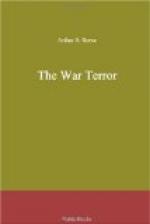At the gate, instead of turning toward the town, however, Kennedy went on and entered the grounds of the Minturn house next door. The lawyer, I had understood, was a widower and, though he lived in Stratfield only part of the time, still maintained his house there.
We rang the bell and a middle-aged housekeeper answered.
“I am from the water company,” he began politely. “We are testing the water, perhaps will supply consumers with filters. Can you let me have a sample?”
She did not demur, but invited us in. As she drew the water, Craig watched her hands closely. She seemed to have difficulty in holding the glass, and as she handed it to him, I noticed a peculiar hanging down of the wrist. Kennedy poured the sample into a second vial, and I noticed that it was turbid, too. With no mention of the tragedy to her employer, he excused himself, and we walked slowly back to the road.
Between the two houses Kennedy paused, and for several moments appeared to be studying them.
We walked slowly back along the road to the town. As we passed the local drug store, Kennedy turned and sauntered in.
He found it easy enough to get into conversation with the druggist, after making a small purchase, and in the course of a few minutes we found ourselves gossiping behind the partition that shut off the arcana of the prescription counter from the rest of the store.
Gradually Kennedy led the conversation around to the point which he wanted, and asked, “I wish you’d let me fix up a little sulphureted hydrogen.”
“Go ahead,” granted the druggist good-naturedly. “I guess you can do it. You know as much about drugs as I do. I can stand the smell, if you can.”
Kennedy smiled and set to work.
Slowly he passed the gas through the samples of water he had taken from the two houses. As he did so the gas, bubbling through, made a blackish precipitate.
“What is it?” asked the druggist curiously.
“Lead sulphide,” replied Kennedy, stroking his chin. “This is an extremely delicate test. Why, one can get a distinct brownish tinge if lead is present in even incredibly minute quantities.”
He continued to work over the vials ranged on the table before him.
“The water contains, I should say, from ten to fifteen hundredths of a grain of lead to the gallon,” he remarked finally.
“Where did it come from?” asked the druggist, unable longer to restrain his curiosity.
“I got it up at Pearcy’s,” Kennedy replied frankly, turning to observe whether the druggist might betray any knowledge of it.
“That’s strange,” he replied in genuine surprise. “Our water in Stratfield is supplied by a company to a large area, and it has always seemed to me to be of great organic purity.”
“But the pipes are of lead, are they not?” asked Kennedy.
“Y-yes,” answered the druggist, “I think in most places the service pipes are of lead. But,” he added earnestly as he saw the implication of his admission, “water has never to my knowledge been found to attack the pipes so as to affect its quality injuriously.”




